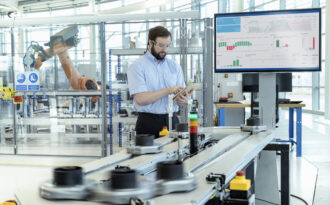

10 min lesen
May 17, 2024
What role does customised development play in the transition to Industry 4.0 and how does it create more flexibility and efficiency in production? This article provides an in-depth look at the application of the Internet of Things, artificial intelligence, and big data, demonstrating how they shape custom solutions that are tailored to individual customer requirements while also being crucial for companies in a competitive market.
Often referred to as the fourth industrial revolution, Industry 4.0 marks a significant turning point in industrial history, characterized by the comprehensive digitalization and networking of all business elements, from production to services, logistics, and resource planning.
Industry 4.0 is defined by the integration of technologies such as the Internet of Things (IoT), artificial intelligence (AI), big data, and cloud computing, which work together to create intelligent, automated, and connected production environments. This development enables greater efficiency, flexibility, and customization in production, as well as improved communication between the various components of the manufacturing system.
Custom development allows for the flexibilization of production in factories, extending to the manufacturing of individual products tailored to customer specifications—a core goal of Industry 4.0. Another crucial aspect is the continuous tracking of products from customer order to the manufacturing process. This is supported by the self-regulation of production processes in real-time, optimizing the entire value chain.
The recent pandemic has accelerated the need for resilience and agility in Industry 4.0. This makes custom development even more significant as a response to increased productivity demands and changes in the production environment.
By implementing service-based production systems, Industry 4.0 achieves higher efficiency and greater customer proximity. This leads to increased revenue and opens new opportunities in the automation of mass production. Industry 4.0 enables products and manufacturing processes to be flexibly adapted to individual customer requirements. This results in more efficient mass production and the realization of Industry 4.0 through optimized production workflows.
The ability to offer customized products quickly and efficiently creates significant competitive advantages. This can drastically reduce the response time from customer order to fulfillment. Thus, we see how custom development enables companies not only to increase their productivity but also to build closer relationships with their customers.
By implementing service-based production systems, Industry 4.0 can achieve higher efficiency and greater proximity to customers. This leads to increased revenues and opens new opportunities in the automation of mass production. Industry 4.0 enables products and manufacturing processes to be flexibly adapted to individual customer requirements. This results in more efficient mass production and the realization of Industry 4.0 through optimized production workflows.
The ability to offer customized products quickly and efficiently creates significant competitive advantages. This can drastically reduce the response time from customer order to fulfillment. Thus, we see how custom development enables companies not only to increase their productivity but also to build closer relationships with their customers.
One of the key applications of custom solutions is robotics technology. It is used in various fields, from intralogistics to painting, software engineering, and system integration. The range includes industrial robots, automated milking robots, and household robots.
Another exciting area of application is virtual reality (VR) and augmented reality (AR). These enable real-time interaction in a digitally generated environment, merging virtual and real worlds. They offer applications in:
Cyber-physical systems, which connect software components with mechanical and electronic parts and enable communication between them, are used in smart power grids, e-health, and to enhance the adaptability of production systems. RFID systems allow for contactless data storage and retrieval through radio waves and support applications in areas such as logistics, animal tracking, and process optimization across various industries.
Custom development in Industry 4.0 is made possible by a range of technologies and components. A key goal of Industry 4.0 is to achieve the objective of ‘batch size one.’ This allows the manufacturing of individually customized products according to customer specifications by electronically transmitting production orders to machines. Big Data refers to the use and analysis of large and complex datasets, utilizing IT concepts to filter information from various sources for different applications.
3D printing technology breaks the boundaries of traditional manufacturing by enabling the creation of complex geometries and internal cavities in components. Materials such as metals, plastics, and ceramics are used in this process. The key components of Industry 4.0 that are crucial for custom development include the Internet of Things (IoT) in manufacturing, AI applications, and Big Data analytics.
The Internet of Things (IoT) plays a crucial role in Industry 4.0. It enables the creation of fundamental connectivity in manufacturing, where production facilities and entire production processes are networked using technologies such as Wi-Fi. IoT sensors in operational automation allow for the monitoring and control of production equipment while collecting data to increase productivity.
SAP Manufacturing Execution, for example, provides central control and management of manufacturing processes as well as automated data collection from the Internet of Things. SAP S/4HANA Manufacturing supports fully integrated manufacturing processes, including production, quality management, and the integration of external partners.
Edge computing supports new business models and technologies in the IoT context by enabling real-time analysis and processing of data at the network periphery.
Artificial intelligence is another key component of custom development in Industry 4.0. At the final stage of the smart factory, algorithms control machines autonomously and adapt intelligently to changing conditions, allowing for flexible responses to customer demands. AI is considered a megatrend in Industry 4.0, with machine learning and predictive maintenance among the most widespread applications.
Machine learning enables computers to detect patterns and defects, making industrial manufacturing more efficient and advanced. An example of this is the REMORA project, which aims to simplify the integration of AI into real-time machine data analysis.
Big Data refers to large volumes of highly complex data that are used in the smart factory for (semi-)autonomous machine decisions. With the use of Big Data analytics, production processes become self-regulating and automatically adjust to external influences. Errors are detected early, and processes are automatically optimized.
A notable example of application is the collaboration between Audi and Intel. It resulted in a machine learning algorithm trained to detect faulty weld seams, which can be scaled across different processors without software modifications. This application of Big Data analytics demonstrates the potential of this technology for custom development in Industry 4.0.
Despite the numerous advantages of custom development in Industry 4.0, there are also several challenges that companies must overcome when implementing custom solutions. These challenges include data protection and security concerns, compatibility and interoperability issues, as well as the need for scalability and flexibility.
The scalability and flexibility of custom solutions require a socio-technical approach that simultaneously considers technological, organizational, and human dimensions. This makes the implementation of custom solutions a complex task that requires both technical expertise and a deep understanding of the specific requirements and needs of the company.
A central risk in implementing custom solutions in Industry 4.0 is data protection and cybersecurity. The implementation of Industry 4.0 technologies introduces new attack vectors for cyber threats that can be exploited by attackers.
Smart manufacturing systems can be compromised through unconventional methods, even if they are considered isolated from the corporate network and the outside world. Blockchain technology is increasingly recognized for applications beyond cryptocurrencies, offering transparent and secure data blocks that are distributed across network nodes in a decentralized manner.
Another obstacle in implementing custom solutions in Industry 4.0 is compatibility and interoperability issues. Master data systems vary significantly in structure and data requirements, making integration with Industry 4.0 solutions—often requiring a unified data model—more difficult.
The transition from traditional master data systems to Industry 4.0-compatible systems cannot happen all at once due to dependencies on existing systems and the principle of data deduplication.
A service-oriented architecture (SOA) in production promotes collaboration by clearly separating service providers and consumers, leading to flexible manufacturing processes without unintended side effects when changes are made.
The ability to adapt to growing or changing requirements is a key criterion for the success of custom solutions in Industry 4.0. Developing risk-optimized implementation paths involves creating scalable and flexible solutions that take socio-technical patterns into account.
This means that companies must be able to scale their custom solutions quickly and efficiently to respond to changes in the production environment. At the same time, they must be flexible enough to adapt to changing customer demands and market conditions.
To illustrate the benefits of custom development in Industry 4.0, we examine several case studies of successful implementations. A notable collaboration took place between Audi and Intel. In their Neckarsulm plant, a proof of concept was conducted to improve the quality of vehicle welds using predictive analytics and machine learning.
The partnership between Audi and Intel resulted in a machine learning algorithm trained to detect faulty welds, which can be scaled across different processors without software modifications. This demonstrates the flexibility of the software for various manufacturing applications.
Audi’s transition from manual inspections to an automated system led to a reduction in labor costs by 30% to 50% in the Neckarsulm factory, while also proactively preventing problems rather than reacting to them. This shift can be considered a form of revolution.
A successful implementation of custom solutions in Industry 4.0 relies on best practices such as cooperative collaboration with stakeholders and agile development methods. Data protection and security concerns play a central role, as do continuous integration and continuous deployment, allowing for rapid responses to market needs.
Cooperative collaboration is essential, with internal teams working closely with external partners and utilizing a middleware architecture to ensure system compatibility and interoperability.
Agile development methods such as Design Thinking and MVP (Minimum Viable Product) enable rapid iteration of products and precise adaptation to customer needs.
Continuous monitoring and improvement are crucial for operational efficiency, allowing for the early detection and resolution of issues such as overheating or failures in production equipment. Regular maintenance by technical personnel helps minimize downtime and costs, strengthening competitiveness.
Custom development in Industry 4.0 is in a dynamic phase of innovation, driven by significant advancements in IoT sensor technology and the further development of AI algorithms. These technologies are central to capturing and processing precise real-time data, significantly enhancing and adapting production processes.
IoT sensor technology plays a key role by continuously delivering data streams from the production environment. This data not only improves monitoring and control of manufacturing processes but also enables the development of tailored solutions that align precisely with specific production requirements. Ongoing improvements in sensor technology enhance the accuracy and reliability of this data, leading to optimized resource utilization and cost efficiency.
The advancement of AI algorithms contributes to making machines and systems smarter and capable of autonomously responding to changes in their operating environment. These algorithms analyze large datasets, detect patterns, and predict potential failures before they occur, making maintenance proactive and less disruptive. Additionally, they enable adaptive production control, which flexibly responds to individual customer demands and specific market conditions.
Edge computing further reinforces these trends by shifting data processing to the network’s edge, directly at the source of data generation. This significantly reduces latency and enhances system responsiveness. In Industry 4.0, edge computing enables fast and efficient data analysis, which is crucial for supporting real-time decision-making in production.
In summary, custom development in Industry 4.0 plays a crucial role in shaping the fourth industrial revolution. By applying cutting-edge technologies such as IoT, AI, and Big Data, companies can optimize their production processes, better adapt to customer needs, and increase their competitiveness in the market.
Despite the challenges associated with implementing these technologies, they offer enormous potential for the future of manufacturing. Ongoing advancements in areas such as IoT sensor technology, AI algorithms, and edge computing promise even more efficient and customer-tailored production in the future.
The Platform Industry 4.0 refers to the entirety of technologies and systems that support the digital transformation of manufacturing. It includes the Internet of Things, Big Data, and AI, which together create a connected environment to enable efficient and flexible production processes.
Automation transforms production lines through the use of robots and intelligent systems that increase efficiency and reduce costs. These systems allow companies to respond quickly to market changes and improve product quality.
Edge computing brings data processing closer to the assembly lines, enabling faster response times and lower latency. This improves the precision and efficiency of assembly processes and supports the implementation of customized, flexible manufacturing systems.
IoT sensor technology enables comprehensive monitoring of environmental conditions in industrial facilities. This helps ensure compliance with environmental protection standards and supports companies in achieving their sustainability goals through precise control of energy consumption and emission levels.

October 8, 2025
The biomethane sector is entering a decisive phase. Driven by climate targets, stricter regulations, and rising demand for renewable energy, the market is experiencing rapid growth. Yet, this expansion also creates new op...

February 3, 2025
The future of ERP lies in more efficient and flexible business solutions. In this article, you will discover how .NET-based ERP systems help you optimize processes while remaining adaptable. Explore the key benefits and technological advancemen...